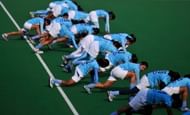
That is just the start. The “Bring back Hockey” programme needs a campaign to win the hearts and minds of Indians. A simple example will illustrate the issue – just today (1st August 2013), I watched the Indian U-21 women’s team defeat a higher ranked Spain in the quarter final to enter the semi-final. It took three hours before any mainstream news website would report the news.
Contrast this with the U-19 cricket victory last year in Australia. It was carried live on TV and news anchors gave updates every 30 minutes as part of regular news updates and Unmukt Chand’s century was the main news of that day and there were interviews with his parents. I don’t think anyone, outside of passionate hockey fan circles, even knew that we had a U-21 women’s team playing a world cup in Germany. I do hope they will do a Chak de and they have done us proud despite the system that is loaded against them succeeding.
The one way to bring hockey into mainstream consciousness would be to create hockey festivals in every district of the country. The hockey festivals would be events where families can come out to have a fun day. It could consist of pure entertainments (like concerts and other events like a carnival) interspersed with everyone who comes there to form into teams and play maybe five to ten minutes of hockey with a softball. So we encourage mothers and fathers to pick up a hockey stick and form into teams and try scoring goals.
We get children in the various age groups also to play a small amount of time. These could be tied to brand promotions of household items are given out as prizes. We could get celebrities to come with their families to play and be brand ambassadors. This would just help put hockey back into our lives. We need to become a sporting nation and not couch potatoes and then express anguish at our national teams’ elimination. Since this would be an event for the whole family, we should easily find corporate sponsors. We basically need parents to start thinking about hockey and eventually becoming supporters of hockey over time.
At the same time, we should be developing a generation of players who are growing up playing hockey as it is played in the elite nations such as Netherlands, Australia and Germany. At the school and district levels, we need to get fully trained coaches working with promising players on correct techniques so that basic skills like dribbling and trapping a cleanly hit ball is learnt at an early age.
In addition, they need to understand very early on that hockey is also a game of mind and how to play possession when you are in front and how to force penalty corners when in the circle. These skills need to be honed in a competitive environment and so we need to ensure that there are little hockey leagues for various age groups where children are able to play competitive hockey every few months in a year. These tournaments should have a nested arrangement whereby better teams and players can keep playing higher up towards a national league of hockey. If we implement such a grass root development programme of hockey we might, in 15 years, be back where we belong.
Around this period of building up a new generation of players, we also need to get good administrators in place who should emulate BCCI in influencing policies and rules governing the sport of hockey. The rules started changing to suit a European style of physical game that put countries such as India and Pakistan at a disadvantage. As expected, the retirees who run our game were asleep at the wheel or busy playing politics that has left no time to do an analysis of what each of those changes meant for us and to respond.
If we are smart, we should get back into International Hockey Administration, with the support of many developing countries that play hockey, and make the sport a little less physical and more dependent on nimble skills. If we attract the Indian middle class to start following hockey and start winning, the sponsors are going to flood hockey and India can easily use the financial heft to build a constituency of support for our ideas of how hockey should be played among the members of FIH.
The Indian team, despite all the shortcomings pointed out above, may spring a surprise by winning Asia cup and qualifying for the world cup in 2014. Despite that, it would be impossible to disprove my analysis that our cupboard is bare and in fact the resulting euphoria, should we win in KL, reinforces my argument. A celebration of just qualifying for a World Cup or an Olympics shows how badly India, an eight time gold medallist and a world cup winner, has fallen. If we continue in this vein, Indian hockey is surely destined to be consigned to the dust bin of history.
